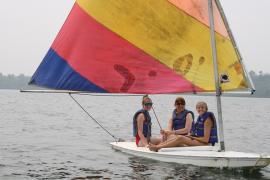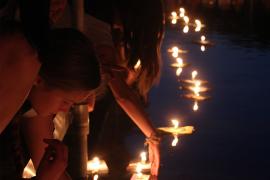Twelve-plus-hour days. Extreme temperatures. Mental and physical exhaustion. Low pay. Sound like fun? Then why do millions of teens and 20-something-year-olds work at camp every summer? Better yet, why do camp professionals make a career out of it? The answer lies with the purpose of camp: to make a positive difference in the life of a child. That is why so many choose the fulfilling and rewarding work of summer camp every year.
I remember my first summer as a camp counselor 23 years ago at the West End YMCA in Willoughby, Ohio. They were looking for more male camp counselors (a challenge to this day with camps), so a high school friend reached out to me. Knowing that I wanted to be a future educator, it was a great opportunity for me the summer before starting college. I would get paid to have fun and work with kids. Sounded like a no-brainer to me! Little did I know that decision to work at camp would ultimately change my entire life and career path. One thing I remember vividly during my three summers working at that camp was our Branch Executive Director, Bob Hoffman, coming in to talk with us during summer camp staff training. He explained to us the incredible amount of responsibility that we had as camp counselors. We were ultimately responsible for a parent’s most prized possession: their child. He also explained that we would see most of our campers more than their parents would see them, as many of our parents used day camp as childcare for their children. But he also explained that we could be the difference in the children we served.
Fast forward 23 years later after working with camps as a camp counselor, camp director, and camping specialist, as well as a parent of a young camper, I fully understand the purpose and value of summer camp for children, especially in today’s age. With a constant connection to technology and screen addiction, leading to Richard Louv’s coined term, “Nature Deficit Disorder,” the work of camp is more important now than ever! So, as camp professionals, how can we convince the next generation to work at summer camp when there are so many competing priorities for them: better paying summer jobs, professional internships, and summer vacations with family? I think we “start with why.”
As an adjunct lecturer last year in our Parks, Recreation, and Tourism Management program at NC State University who taught our major’s core leadership class, as well as a huge fan of Simon Sinek, I showed Simon Sinek’s “Start with Why” Ted Talk on our first day of class. I believe it made a difference for our students, as many of them wrote about the talk in their final research paper and many chose a Simon Sinek book for their leadership book reflection assignment. By getting potential summer camp staff to understand the “why” of working at camp, I believe they are more likely to be motivated to work at camp for the right reason: to make a positive difference in the life of a child. As camp staff, we have an opportunity to create a sense of community and connection for children that they can’t get through school, sports, or virtually through technology. In today’s times of systemic racism and the challenges we face with COVID-19, there has never been a more important time for working at camp than now!
One of the stories I remember most from my mentor at our North Carolina 4-H Camps, Larry Hancock, was the story of The Boy and the Starfish. He would tell this story when we would speak to our summer camp staff during our summer camp staff training. The story is as follows.
An old man was doing his daily walk along the beach one morning, when he spotted a young boy crouched by the water, scooping something up from the sand and throwing it into the sea.
The beach was normally empty at this time of day, and so the old man stopped to watch for a while.
He noticed that the boy kept on shuffling a little further down the beach, then repeating this same action again and again — stopping, scooping, throwing, moving.
“What are you doing there, boy?” the old man asked, walking closer.
“I’m saving these starfish that are stranded,” replied the boy. “If they stay on the beach they will dry out and die, so I’m putting them back into the ocean so they can live.”
The old man was silent for a few seconds.
“Young man,” he said, “on this stretch of beach alone, there must be more than one hundred stranded starfish. Around the next corner, there must be at least one thousand more. This goes on for miles and miles and miles – I’ve done this walk every day for 10 years, and it’s always the same. There must be millions of stranded starfish! I hate to say it, but you’ll never make a difference.”
The boy replied, “Well I just made a difference for that one,” and continued with his work.
The same goes for working at summer camp. There are millions of children across our country and around the world who need our help. While we may not be able to help each and every child, we can make a difference, one child at a time.
This blog was written as part of Project Real Job’s initiative to support camps with staff recruiting, hiring, and retention efforts.
Photo courtesy of North Star Reach in Pinckney, Michigan
Dave Herpy is NC 4-H Camping Specialist and Adjunct Lecturer of Parks, Recreation and Tourism Management at North Carolina State University, as well as a freelance writer and blogger. He has over 23 years of experience with camps as a camp counselor, camp director, and camping specialist in non-profit, municipal, and university settings. His greatest adventure in life is being a father of four and sharing his passion for camp with his own children. He can be reached via email [email protected] or follow him at explorenc.travel.blog.
The views and opinions expressed by contributors are their own and do not necessarily reflect the views of the American Camp Association or ACA employees.



